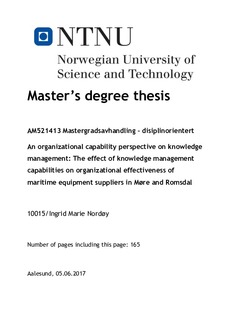| dc.description.abstract | Previous studies have emphasized the importance of knowledge management
capabilities (KMC´s) and outlined their influence on organizational effectiveness.
Today’s economic environment has been described as knowledge based and
knowledge management (KM) is recognized as the most important resource of the
modern organization. However, few researchers focus on knowledge management
capabilities in a Norwegian context.
The present study investigates the relationship between the KMC´s and organizational
effectiveness of maritime equipment supplier in Møre and Romsdal. Moreover, the
moderating effect of firm size and outsourcing on the relationship of the model is
analysed. The research of Gold et al. (2001) is adopted to fit the context of the cluster,
and a triangulated method approach is utilized. Three preliminary in-depth interviews
were conducted to analyse the fit of the research model to the context of the
equipment suppliers and to obtain better understanding of the research topic. Through
a survey distributed to all 169 suppliers, empirical data of 70 respondents were
collected. From statistical analysis conducted in SPSS and SmartPLS, results
indicated that Knowledge culture and Knowledge structure are important constructs
of KM infrastructure capability. Knowledge application was found to be an important
contributor to KM process capability. Process capabilities were also found to inflict
positive impact on organizational effectiveness, indicating that increased efforts in
such activities will enhance the equipments suppliers’ effectiveness. Contradictive to
initial indications, KM infrastructure capability was not found to significantly affect
organizational effectiveness. Furthermore, intensity of outsourcing was found to
decrease the relationship between KM infrastructure and organizational effectiveness.
However firm size, as a moderator on the relationships of the model was not detected.
To the end of this thesis the discussion of the relative findings, implications,
limitations and suggestions to further research on the topic is presented.
Keywords: Knowledge Management, Knowledge Management Capabilities,
Outsourcing, Firm Size | nb_NO |

